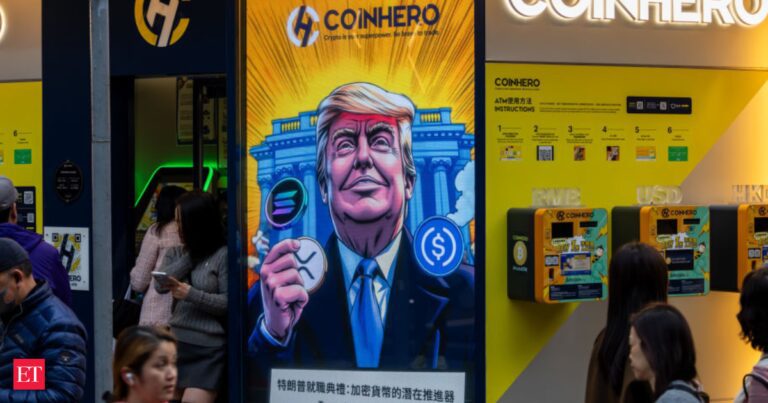 Bloomberg
BloombergYet perhaps the crypto world’s turn against Trump speaks to a deeper anxiety about the sustainability of the broader digital asset rally, which has seen the price of Bitcoin rise more than 160% in a year thanks to broader institutional support from BlackRock Inc. and the promise of friendlier regulation. Beneath the surface, speculative fervor for meme coins has been building for some time, with squirrel-themed token PNUT hitting a $1 billion market cap last year and girl Hawk Tuah who flipped his own coin (with disastrous results). The crypto lemon squeeze could be the moment when the entire market seems as frothy as in 2017, when money was poured into risky initial coin offerings, or in 2022, when it is non-fungible . the tokens made millions. Bitcoin may aspire to become digital gold, but the latest crash saw it fall 67% in a year.
It’s also rather convenient for crypto elites to suddenly show concern for the average punter when the Trump campaign has shown little interest in prioritizing financial stability or consumer protection. Isn’t the president’s repeated sale of NFTs enough of a clue? Or his support for the government HODLing Bitcoin, which would make taxpayers pay for an asset that has been around less time than Pokémon cards? Or the promise of more favorable regulation just as the courts sift through the debris of the $40 billion Terra crash in 2022? Trump’s position has always suggested greater convergence between traditional finance and crypto, volatility be damned. Given the interconnectivity of crypto markets and the impact of leverage on asset prices which can go down as well as up, this means greater systemic risk – and greater potential crises.
Regardless of one’s opinion of the value of cryptocurrencies – and even hardened crypto skeptics have to admit that Bitcoiners remain in the dark despite the lack of everyday use cases – something in this moment sounds like a story that won’t end well. Aside from the threat posed by Trump’s personal conflicts and the fact that his own supporters could be defrauded, the ultimate risk is that of a monetary system so flooded with bad money that it drives out good money. “A president and an administration that advocates these reckless ideas may also decide, just as recklessly, that they want to interfere with responsible management (of the Federal Reserve),” says Barry Eichengreen, an economist at the University of California, Berkeley. “If they did, it would pose a real risk to the international role of the dollar.” Hopefully someone will hide the coin’s matchbox soon.

